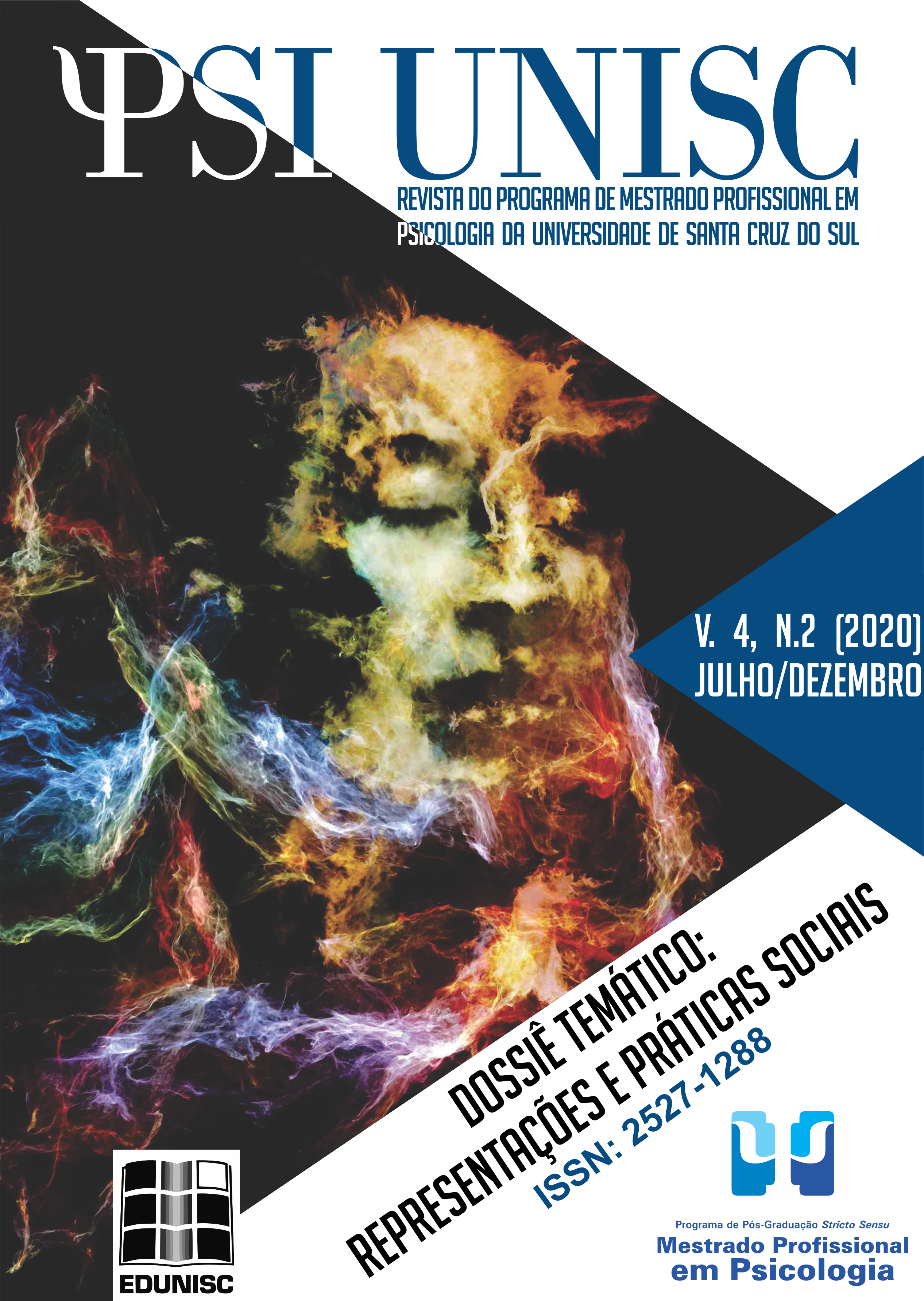Home Visit: “Talking We Understand Each Other”
DOI:
https://doi.org/10.17058/psiunisc.v4i2.14943Keywords:
Social assistance, Family, Centro de referência, Social representations.Abstract
Home visits are a strategy of care linked to the social assistance politics and they are part of the actions developed by the Reference Centers for Social Assistance (RCSA). This article intends to analyze, within the frame of the Theory of Social Representations (TRS), how the users of a RCSA have understood the home visits carried by the professionals of this unit. Observation of the home visits, reported on field diary, and group discussion (round table) were applied to construct information. Within representations about the practice of home visits it was possible to think how it has been developed and what it means for families and society. The participants shared representations about the home visit, demonstrating that it is associated with antinomies such as good/bad, security/insecurity and freedom/oppression. The participants discussed issues related to dialogicity, control, punishment and a possible vocation to perform certain functions. It is concluded that, in addition to scripts and protocols, it is essential to base care and build interventions in an ethical dialogical communication.Home visits are a strategy of care linked to the social assistance politics and they are part of the actions developed by the Reference Centers for Social Assistance (RCSA). This article intends to analyze, within the frame of the Theory of Social Representations (TRS), how the users of a RCSA have understood the home visits carried by the professionals of this unit. Observation of the home visits, reported on field diary, and group discussion (round table) were applied to construct information. Within representations about the practice of home visits it was possible to think how it has been developed and what it means for families and society. The participants shared representations about the home visit, demonstrating that it is associated with antinomies such as good/bad, security/insecurity and freedom/oppression. The participants discussed issues related to dialogicity, control, punishment and a possible vocation to perform certain functions. It is concluded that, in addition to scripts and protocols, it is essential to base care and build interventions in an ethical dialogical communication.Downloads
References
Andrade, A. M., Guimarães, A. M. D. N., Costa, D. M., Machado, L. C., & Gois, C. F. L. (2014). Visita domiciliar: validação de um instrumento para registro e acompanhamento dos indivíduos e das famílias. Epidemiologia e Serviços de Saúde, 23(1), 165-175. doi: 10.5123/S1679-49742014000100016
Arruda, A. (2009). Meandros da teoria: a dimensão afetiva das representações sociais. In A. M. O. Almeida, & D. Jodelet (Orgs.), Representações Sociais: interdisciplinaridade e diversidade de paradigmas (pp. 83-104). Brasília, DF: Thesarus.
Bones Rocha, K., Conz, J., Barcinski, M., Paiva, D., & Pizzinato, A. (2017). A visita domiciliar no contexto da saúde: uma revisão de literatura. Psicologia, Saúde e Doenças, 18(1), 170-185. doi: 10.15309/17psd180115
Brasil. (2012). Orientações Técnicas sobre o PAIF. Ministério do Desenvolvimento Social e Combate à Fome. Secretaria Nacional de Assistência Social. 1a ed. Brasília, DF: MDS.
Brasil (2005). Política Nacional de Assistência Social PNAS/ 2004. Norma Operacional Básica NOB/SUA. Brasília, DF: Ministério do Desenvolvimento Social e Combate à Fome Secretaria Nacional de Assistência Social.
Crepop. (2007). Referência Técnica para atuação do(a) psicólogo(a) no CRAS/SUAS. Centro de Referência Técnica em Psicologia e Políticas Públicas. Conselho Federal de Psicologia (CFP). Brasília, DF: CFP.
Cruz, L. R., & Guareschi, N. M. de F. (2009). A constituição da assistência social como política pública: interrogações à psicologia. In L. R. Cruz, & N. M. de F. Guareschi (Orgs.), Políticas Públicas e Assistência Social. Diálogos com as práticas psicológicas (pp. 13-40). Petrópolis, RJ: Vozes.
Cruz, M. M., & Bourget, M. M. M. (2010). A visita domiciliária na Estratégia de Saúde da Família: conhecendo as percepções das famílias. Saúde e Sociedade, 19(3), 605-613. doi: 10.1590/S0104-12902010000300012
Donzelot, J. (1986). A Polícia das Famílias (2a ed.). Rio de Janeiro, RJ: Edições Graal.
Ferreira, A. B. de H. (1987). Pequeno Dicionário Brasileiro da Língua Portuguesa (11a ed.). Rio de Janeiro, RJ: Civilização Brasileira.
Foucault, M. (1999). Em defesa da sociedade. São Paulo, SP: Martins Fontes.
Gil, A. C. (2002). Como elaborar projetos de pesquisa (4a ed.). São Paulo, SP: Atlas.
Guareschi, P. (2009). Psicologia Social Crítica como prática de libertação. Porto Alegre, RS: EDIPUCRS.
Jovchelovitch, S. (2008). Contextos do saber: representações, comunidade e cultura. Petrópolis, RJ: Vozes.
Macêdo, O. J. V., Lima, C. M. P. D., Brito, F. H. S., Souza, J. N. P., Sousa, N. K. M., Sousa, S. P., & Dias, S. G. (2018). Atuação dos Profissionais de Psicologia nos CRAS do Interior da Paraíba. Temas em Psicologia, 26(2), 1083-1097. doi: 10.9788/tp2018.2-20pt
Marková, I. (2006). Dialogicidade e representações sociais: as dinâmicas da mente. Petrópolis, RJ: Vozes.
Méllo, R. P., Silva, A. A., Lima, M. L. C., & Di Paolo, A. F. (2007). Construcionismo, práticas discursivas e possibilidades de pesquisa em psicologia social. Psicologia & Sociedade, 19(3), 26-32. doi: 10.1590/S0102-71822007000300005
Minayo, M. C. de S. (Org.). (2007). Pesquisa social: teoria, método e criatividade (25a ed.). Petrópolis, RJ: Vozes.
Moscovici, S. (2003). Representações Sociais: investigações em psicologia social. Petrópolis, RJ: Vozes.
Morigi, V. J., Stueber, K., Engelmann, S. I., & Cresqui, C. (2019). Tensões nas representações sobre a democracia nos atos contra e pró-impeachment do Governo Dilma Rousseff na cobertura do jornal Folha de São Paulo em 2015. Intexto, 0(42), 36-55. doi: 10.19132/1807-8583201842.36-55
Oliveira, I. F., Dantas, C. M. B., Solon, A. F. A. C., & Amorim, K. M. O. (2011). A prática psicológica na proteção social básica do SUAS. Psicologia & Sociedade, 23(spe), 140-149. doi: 10.1590/S0102-71822011000400017
Padilha, M. (2001). Representações sociais: aspectos teórico-metodológicos. Passo Fundo, RS: Universidade de Passo Fundo.
Pereira, V. T., & Guareschi, P. A. (2017). A psicologia no CRAS: um estudo de representações sociais. Psicologia & Sociedade, 29, e119584. doi: 10.1590/1807-0310/2017v29119584
Romanini, M., & Roso, A. (2013). Midiatização da cultura, criminalização e patologização dos usuários de crack: discursos e políticas. Temas em Psicologia, 21(2), 483-497. doi: 10.9788/TP2013.2-14
Santos, T. M. (2018). O trabalho do psicólogo no Cras: diferentes formas de cuidar. Pesquisas e Práticas Psicossociais, 13(1), 1-11. Recuperado de http://www.seer.ufsj.edu.br/index.php/revista_ppp/article/view/2821/1841.
Scott, J. B., Marion, J., Freitas, A. P. M., Ferreira, M., Pereira, C. R. R., & Siqueira, A. C. (2019). Desafios da atuação do psicólogo em centros de referência da assistência social (Cras). Gerais: Revista Interinstitucional de Psicologia, 12(1), 125-141. doi: 10.36298/gerais2019120110
Downloads
Published
How to Cite
Issue
Section
License
The submission of originals to this journal implies the transfer, by the authors, of the printed and digital publication rights. The copyrights for the published articles are those of the author, with periodical rights on the first publication. Authors may only use the same results in other publications clearly indicating this journal as the medium of the original publication. Because we are an open access journal, we allow free use of articles in educational and scientific applications provided the source is cited under the Creative Commons CC-BY license.




